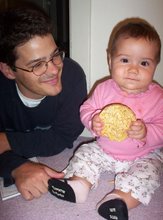Like many lax but well-educated Jews (and Christians), I have long assumed I knew what was in the Bible—more or less. I absorbed other bits of Bible everywhere—from stories I heard in churches and synagogues, movies and TV shows, tidbits my parents and teachers told me. All this left me with a general sense that I knew the Good Book well enough, and that it was a font of crackling stories, Jewish heroes, and moral lessons. o, the tale of Dinah unsettled me, to say the least. If this story was strutting cheerfully through the back half of Genesis, what else had I forgotten or never learned? I decided I would, for the first time as an adult, read the Bible. And I would blog about it as I went along. My goal is pretty simple. I want to find out what happens when an ignorant person actually reads the book on which his religion is based. |
David Katz, a writer for Slate magazine, has undertaken a surprisingly rare task in the blogosphere. He has decided to actually read the bible and engage his readers in a discussion of the text. As a believer in the pursuit of truth and wisdom, as well as a believer in the scriptures as a source of truth, I had assumed that this type of blog would be easy to come by. Alas, I was mistaken. The longer one searches the blogosphere, and for that matter, the internet at large, the more obvious it becomes what many of us had suspected all along. Almost nobody actually reads that thing. For all the preachers waving their bibles around in church, and all the thousands of people listening intently every week, no one's actually doing their homework.
So leave it to the newly invigorated liberal media to get some religion and fill the gap. The fellows over at Slate may fill volumes with their mockery of the religious right, but in this column they're also one-uping them by studying what the other side claims to own. Keep up this honest search for truth, and the liberals might win over some converts. One thing though, they've certainly captured a reader.
So leave it to the newly invigorated liberal media to get some religion and fill the gap. The fellows over at Slate may fill volumes with their mockery of the religious right, but in this column they're also one-uping them by studying what the other side claims to own. Keep up this honest search for truth, and the liberals might win over some converts. One thing though, they've certainly captured a reader.


